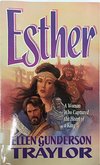Ellen Gunderson Traylor
Autor de John: Son of Thunder
Sobre El Autor
Créditos de la imagen: Ellen Gunderson Traylor
Obras de Ellen Gunderson Traylor
John: Son Of Thunder 1 copia
Marla: Eyewittness 1 copia
DER WANDERER GOTTES 1 copia
Stark Durch Gott 1 copia
Moses, The Deliverer 1 copia
Etiquetado
Conocimiento común
- Fecha de nacimiento
- 1946-12-17
- Género
- female
- Nacionalidad
- USA
Miembros
Reseñas
También Puede Gustarte
Estadísticas
- Obras
- 29
- Miembros
- 1,733
- Popularidad
- #14,831
- Valoración
- 3.7
- Reseñas
- 16
- ISBNs
- 70
- Idiomas
- 3
- Favorito
- 2














Traylor had to attach real motivations to some of the actions and dialog in the account, and both Ruth and Boaz came across just right, in my opinion. Naomi was decent overall, too, though I might have preferred a little more build-up to her comments about being bitter when she first returns to Bethlehem. Orpah, on the other hand, had no love for her mother-in-law, yet wept when she turned back. Even with those notes, though, I thoroughly enjoyed the book and will most likely read it again more than once in the future. In the end, it’s clear to me that this is a love story not only about the romance between a man and woman but between God and man. I can’t recommend this book enough for those who enjoy biblical fiction, and especially those who appreciate the book of Ruth as much as I do.… (más)